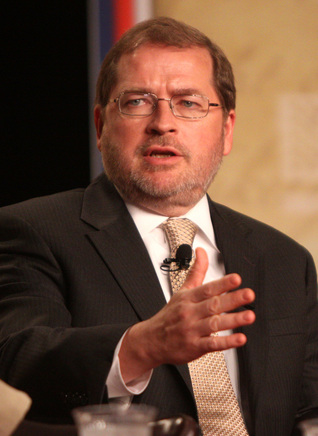
Politics has been described as the art of the possible, but the possible won’t happen without some give here and there. And when unelected people like Grover Norquist come along and pressure politicians to sign pledges that tie their hands, the possible becomes a little more impossible.
Don’t get me wrong. I’m not a fan of tax increases. They pull money out of the economy and away from the job- and wealth-creating private sector. But any fool can see that fixing the nation’s fiscal imbalance will take a combination of cuts, reforms and revenue increases.
You can’t get there if one side refuses to budge on one of those three items, and Norquist would make even intelligent revenue enhancements impossible.
| | The Democrats are just as bull-headed about entitlement reforms, but to be fair, they haven’t signed any pledges. The Norquist pledge looks simple, but it’s not. Norquist is founder and president of Americans for Tax Reform. He started getting Republicans to sign a pledge not to raise taxes back in the mid-1980s. In the early ‘90s, the first President Bush famously violated his own “Read my lips” declaration against tax hikes and supported raising the highest marginal income tax rate to 31 percent. The rate climbed again to 39.6 percent in 1993, where it held until the “temporary” tax cuts of the George W. Bush era reduced them to 35 percent. "But if you agree, and you truly hold to the no-new-tax pledge, you also would oppose Republican-led proposals to reform the tax code and eliminate loopholes" A lot of lawmakers have been elected since those tax cuts, and many others have been around since before that time. If those cuts were temporary, would a return to the previous rate really be considered a violation of the pledge? Norquist believes so. But if you agree, and you truly hold to the no-new-tax pledge, you also would oppose Republican-led proposals to reform the tax code and eliminate loopholes. Each loophole, after all, is a tax cut for one special interest or another. Removing the loophole is a tax hike for someone out there. Take away the mortgage deduction and see how much more the average family has to pay. Simply put, the tax pledge keeps Washington from doing anything meaningful toward closing the gap between revenues and expenditures. If Republicans aren’t going to come a little way, Democrats won’t, either. And Democrats have the legitimate argument of claiming a slight edge from the recent election. Norquist has likened the pledge to a wedding vow. "I hope his wife understands the commitments last a little longer than two years or something," he said in response to Rep. Peter King, R-N.Y., who said the pledge should be only for the congressional session during which it was signed. That’s an interesting comparison, given the record some politicians have in regard to their marital vows. But it actually cheapens marriage vows, which come with some legal enforcements and protections, and which are vital to civil society and the raising of children. No legislative body can limit or control a future legislative body, nor should an elected official be kept from dealing with problems because of conditions that existed long ago. Norquist never has been elected to anything. Republicans signed his pledge because, as politicians, they understood the public wanted to hold the line on taxes. The public now seems to have changed its mind, based on election results and exit-polling. If Republicans were to offer tax reforms, loophole eliminations and a slight increase in the top marginal rate, the pressure would be squarely on Democrats to offer their own concessions. The alternative — doing nothing — won’t destroy the country on Jan. 1. But it would signal that politicians have little intention of hammering out solutions to the nation’s serious long-term fiscal problems. Politics will have lost its art in the name of bull-headed ideology. |

 RSS Feed
RSS Feed

